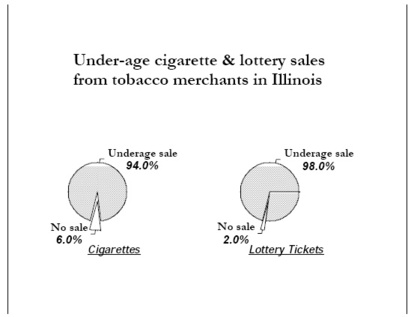The WAGER, Vol. 2(50) – Selling lottery tickets to underage consumers
A range of research studies has confirmed that underage adolescents are gambling in both informal activities (sports betting, games of skill) and formally structured gambling activities (lottery tickets, casino games). In most states, of course, formal gambling activities are illegal for adolescents under eighteen. A study conducted in Illinois examined the ease with which underage customers can purchase lottery tickets. A 16-year old who “did not appear older than her stated age” attempted to purchase a $1 lottery ticket and cigarettes in tobacco merchant retail shops in Illinois. Of the 50 tobacco merchants who sold lottery tickets, 49 sold a lottery ticket to the 16-year old, and 47 sold her cigarettes. Two of the three shops that refused to sell her cigarettes allowed her to purchase a lottery ticket. The author of this study suggests that compliance checks are more effective than merchant education at decreasing the percentage of retail shops selling lottery tickets to minors. Compliance checks by a license inspector is estimated to cost $35 per merchant for four checks per year. Although there is no evidence that the lottery industry is targeting adolescents as potential customers, the industry is emphasizing the importance of broadening the base of lottery players for the long-term health of the lottery industry.** Industry research has discovered that while “core players” (those who are already regular lottery players) have reached their spending limits, most lotteries have failed to attract infrequent and non players into the lottery pool. The combination of adolescents’ interest in gambling, the industry’s economic need to attract new customers, and the willingness of merchants to sell to underage lottery players portrays a risky situation for adolescents. Policy makers, health care providers, and the lottery industry could collaboratively find effective means of ensuring that adolescents do not continue to fill the demand for new lottery customers.
Sources: *Radecki, T.E. (1994). The sales of lottery tickets to minors in Illinois. Journal of Gambling Studies, 10(3), 213-218; **Jones, M. (1997, December). Confronting the player problem. International Wagering & Business Magazine, 18(12), 58, 68.
